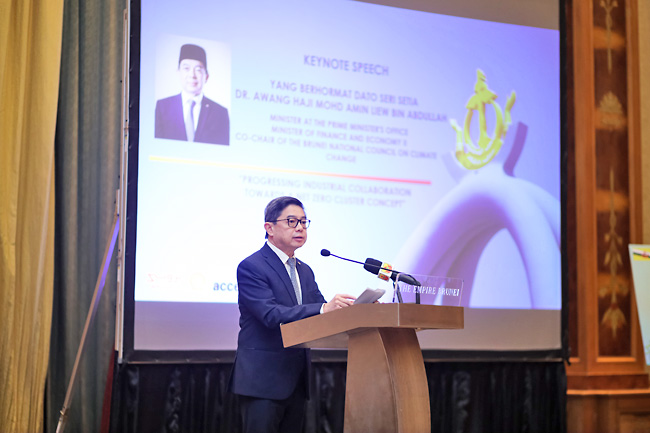In the face of an unprecedented existential threat, climate change looms as the gravest challenge for our nation.
The government’s resolute commitment to tackling this crisis remains unwavering, with focused efforts to prioritise its resolution. Recent data underscores the urgency of the situation. In 2022, industrial greenhouse gas emissions accounted for 64 per cent of Brunei’s total emissions, while the power sector contributed 21 per cent.
Recognising this, the imperative for sustainable economic growth becomes inseparable from a just energy transition. Achieving this transition necessitates a harmonious collaboration between the public and private sectors.
Highlighting the need for unified action towards a just energy transition, Minister at the Prime Minister’s Office and Minister of Finance and Economy II Dato Seri Setia Dr Awang Haji Mohd Amin Liew bin Abdullah in a keynote speech addressed the profound significance of such cooperation.
Speaking at the launch of the workshop themed ‘Progressing Industrial Collaboration towards a Net-Zero Cluster Concept,’ the minister underscored the indispensable role of both sectors in shaping a sustainable future.
Dato Seri Setia Dr Awang Haji Mohd Amin Liew, who also serves as the Co-Chair of the Brunei Darussalam National Council on Climate Change, emphasised, “Our capacity to surmount the multifaceted challenges posed by climate change hinges on our ability to overcome hurdles related to resources, institutions, technology, and more.”

In view of Brunei’s modest size, the minister underscored the paramount importance of harnessing competitive advantages through collaborative ventures, partnerships, and the strategic application of technology.
Acknowledging the pivotal role played by the oil and gas sector in the nation’s economic journey, the minister noted the ongoing endeavours to diversify the economy through downstream oil and gas, food, tourism, info-communication technology and services while ensuring sustainability.
“Our pursuit of diversified economic avenues must remain ecologically mindful,” he cautioned, urging that economic growth must align with environmental preservation to curtail climate impacts.
In a significant stride toward climate resilience, Brunei Darussalam is set to host the ASEAN Centre for Climate Change (ACCC). The minister shared, “The establishment of the ACCC, formalised through a recently signed agreement at the ASEAN Ministerial Meeting on Environment in Lao, will empower ASEAN member states to collectively address climate change challenges.”
This inter-governmental hub aims to bolster regional capabilities to prevent, mitigate, and manage climate-related disasters, while facilitating the exchange of information and expertise. The minister expressed hope that the ongoing workshop would yield robust insights. The minister envisions leveraging the ACCC to foster knowledge sharing, capacity building, and policy coordination, not just within Brunei but also across ASEAN nations.
Drawing inspiration from 20 global net-zero clusters, he stressed the significance of adapting best practices in partnership-building, policy formulation, financing strategies, and technological advancement to suit Brunei’s unique context.
As the nation steers through the uncharted waters of climate change, a steadfast commitment to collaboration, sustainability, and adaptive strategies emerges as the guiding beacon. Brunei stands poised to contribute meaningfully to regional and global efforts to safeguard our shared future. – James Kon




